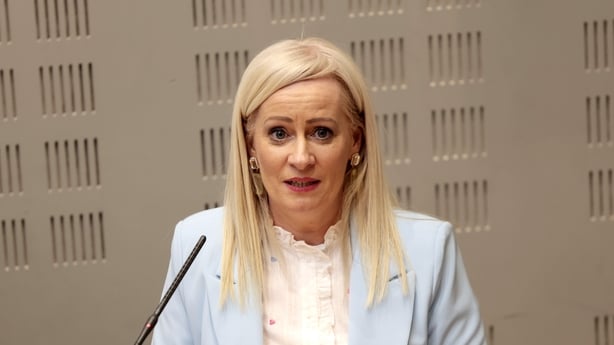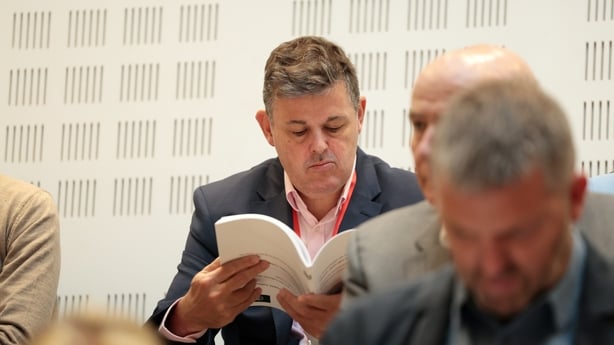An Oireachtas commitee has recommended the abolition of the TV licence fee and its replacement with direct Exchequer funding.
The Joint Committee on Tourism, Culture, Arts Sports and Media published its report on the future business model and long-term funding model for public service media this afternoon.
Its Chair, Deputy Niamh Smyth, said the report includes 29 key recommendations with "a view to bolstering Irish media as a public service good and as a primary vehicle for democracy and equal representation in Ireland."
One of the key areas focuses on the ongoing debate around future funding for public service media.
The report outlines the committee’s overall recommendation that it supports the "abolition of the television licence fee" and recommends direct funding from the Exchequer managed by Coimisiún na Meán, the broadcasting and online media regulator.
This would ensure editorial independence, committee members said.
Deputy Smyth said: "The central theme of this report’s recommendations is a generational reform to the funding model for public service media" adding "the committee recommends multi-annual funding to public service media entities on the basis of corresponding multi-annual strategies and performance commitments."
This stance reflects the view of Minister for Media Catherine Martin, but stands in contrast with senior Cabinet members, including newly-appointed Minister for Finance Jack Chambers, who joins his colleagues, Minister for Public Expenditure Pascal Donohoe and Tánaiste Micheál Martin, in the view that licence fee model should be retained.
Asked about the gap in views on the issue, Ms Martin said that discussions were ongoing and at "an advanced level, but that no decision has yet been made" adding that "it is down to either a revenue-raising element, or the direct funding from the Exchequer."
She said she was "confident we will have a decision by the end of this month."
It is noted in the committee’s report that the conclusion is not its unanimous view. It was explained that members of the committee did not vote on the day for a variety of reasons, but the members told the media briefing that "the vote was taken on a day and the vote results reflects that outcome".

Committee Chair Niamh Smyth, when asked about the impact of the report’s recommendation as it is out of step with influential senior ministers well publicised stances, said "the vote and its outcome reflects the democracy of the committee - that people have diverging views."
She went on to explain how she voted against the recommendation as she believes the licence fee should be retained.
Another member, Sinn Féin Deputy Imelda Munster, pointed out that there were a wide range of views on the matter, with "two Fianna Fáil members voting for and two Fianna Fáil members on the committee voting against the recommendation."
Ms Munster added - during a questions and answers session - "What’s the point of a minister for media if her view and opinion is being blocked by colleagues?"
Fianna Fáil Senator Malcolm Byrne said the committee largely agreed that the TV licence fee is "anachronistic" as most people access media content through online sources, on their phones or tablets.
The committee member said the report was important because nothwithstanding the "obsession" with the licence fee and the funding issue, it dealt with a wide range of issues.
One of the most important aspects of its work, he said, is to highlight the importance of protecting good quality Irish made content.

Other issues addressed in the report include the background to it in the wake of the controversies at RTÉ last summer.
The report states that "while it is a matter of great regret to the Committee and indeed to all stakeholders that trust in public service media has been undermined by poor governance practices, the unprecedented level of public interest in this Committee’s meetings is a testament to the importance with which the Irish public holds its public service media.
"If there is a positive to be found arising from this sorry episode, it is a reinforced focus on reforming our public service media and putting it onto a sustainable footing."
Sinn Féin Senator Fintan Warfield said that he wanted to draw attention to the report's recommendation that "Coimisiún na Meán expedite the establishment of a content levy to support Irish content creation".
He said he believes there is funding stream available, adding that "big tech needs to pay its share".
The issue of trust and the challenge of managing misinformation and disinformation were a running theme through the committee’s comments with Fine Gael Deputy Michael Ring saying: "We won’t be able to tell the truth from lies online so we need to protect it" adding "trusted, safe, honest media - that’s what we hope comes from the report."
"We need to know that we can trust our sources," Fine Gael Deputy Ciarán Cannon said.
'Action' being taken on RTÉ funding - Taoiseach
Taoiseach Simon Harris has told the Dáil that "there is action on" funding for RTÉ.
Mr Harris said that he, Tánaiste Micheál Martin and Minister for the Environment Eamon Ryan had met Ms Martin on Monday at their weekly leaders' meeting.
"I expect we'll meet with her again, I hope this Monday," he said.
He added that a decision will be reached "on what a sustainable model for public service broadcast funding looks like this month".
"There is action on this, I can assure you," he said.
The Taoiseach was responding to Sinn Féin leader Mary Lou McDonald who noted that "in the 20 months to April of this year, over €500,000 has been paid in TV licence fines by ordinary people".







